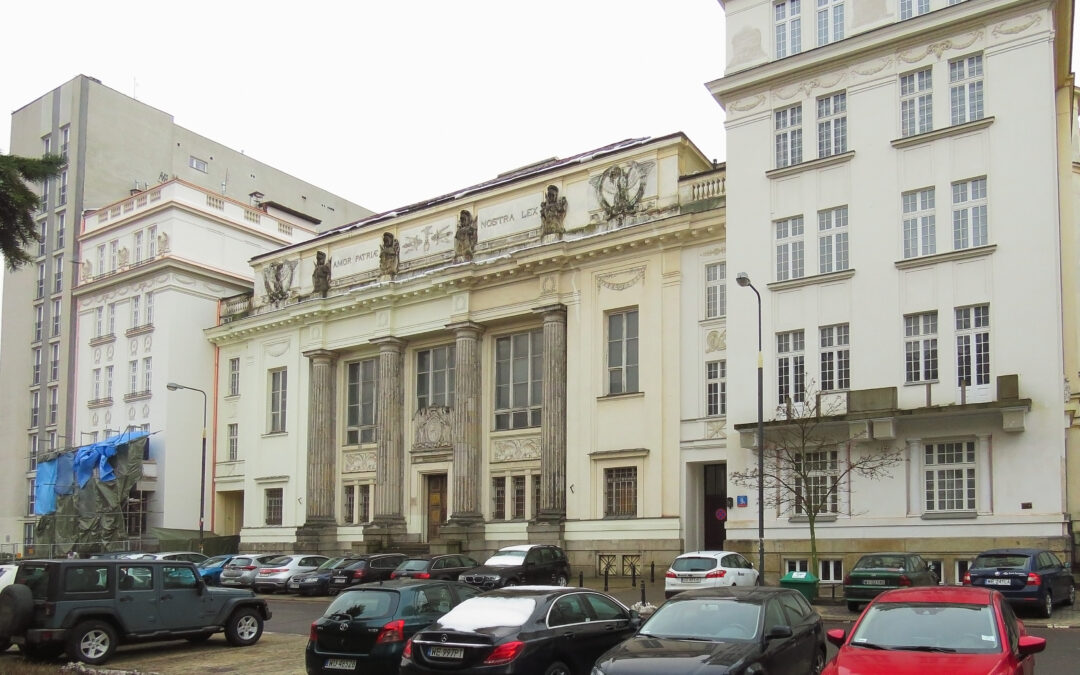A historical building in the heart of Warsaw that has been standing empty for around 30 years amid a legal dispute over its ownership will now be turned into a music library by a local university.
The history of the building located at 9 Okólnik Street dates back to 1912, when a social activist, Edward Krasiński, decided to build a new facility for the library run by his influential family.
The building (pictured above in 2017) consisted of the library, storerooms and two side wings, which housed luxury flats, the rent of which was intended to partly fund the library’s operation.
During World War Two, the German occupiers moved some of the most valuable library collections from all over the city to the building. Following the Warsaw Uprising in 1944, however, they set the priceless collections, including manuscripts, maps, sheet music, engravings and more than two thousand incunabula, on fire.
Zniszczony podczas wojny budynek Biblioteki i Muzeum Ordynacji Krasińskich w Warszawie, w którym zmagazynowano zbiory Biblioteki Narodowej (fot. Polona). pic.twitter.com/n3q2zKBjrD
— Ludka (@ludka142) October 12, 2019
As a result, around 62% of the library’s collection was lost, with the surviving materials transferred after the war to the National Library.
But the building itself survived and was renovated after the war. However, by the 1980s it had fallen into disuse. In 1989, after the fall of the communist regime in Poland, the city of Warsaw took over its management.
However, it could not carry out any work – apart from that necessary to keep the building in a non-life-threatening condition – as the legal status of the property remained uncertain. Since the 1990s, 32 heirs of the Krasiński family have been fighting to regain their rights to the building.
In August this year, however, the proceedings for the return of the library were discontinued, allowing for the building to be put to use again, reports the Gazeta Wyborcza daily.
Poland's new restitution law has been criticised for blocking claims by Holocaust survivors. Israel calls it "antisemitic".
But proponents say it does not discriminate and helps end legal uncertainty
We asked a lawyer to explain what it means in practice https://t.co/DAun2nizt2
— Notes from Poland 🇵🇱 (@notesfrompoland) August 30, 2021
Due to the unclear legal situation, the building has remained vacant for much of the past three decades. However, last week, the city council voted unanimously to hand it over to the Fryderyk Chopin University of Music, which plans to open a Media Library of Polish Music inside.
“Our university has been striving for the possibility to occupy this dilapidated building since the 1960s,” Klaudiusz Baran, the university’s rector, told Gazeta Wyborcza.
“We want to create a space where we can make our sound archive’s rich collections available to Varsovians, tourists and music lovers worldwide. We want to share our heritage and bring this extraordinary building back to life.”
The rector does not yet know when the media centre will open to the public, as the building, whose condition he described as “poor”, must first be checked and then renovated. The culture ministry has promised to participate in the costs of the renovation, Baran said.
The local authorities in the district of Warsaw where the building is located told broadcaster TVN24 earlier this year that a comprehensive renovation of the building could cost up to 20 million zloty (€4.56 million).
Poland's president has submitted a plan to rebuild the historic Saxon Palace in Warsaw, which was destroyed by the Nazi German occupiers in WWII.
The rebuilt palace can become "the beating heart of the reborn Republic of Poland", says the prime minister https://t.co/9ncjbqm4CO
— Notes from Poland 🇵🇱 (@notesfrompoland) July 7, 2021

Notes from Poland is run by a small editorial team and published by an independent, non-profit foundation that is funded through donations from our readers. We cannot do what we do without your support.
Main image credit:

Alicja Ptak is deputy editor-in-chief of Notes from Poland and a multimedia journalist. She has written for Clean Energy Wire and The Times, and she hosts her own podcast, The Warsaw Wire, on Poland’s economy and energy sector. She previously worked for Reuters.



















